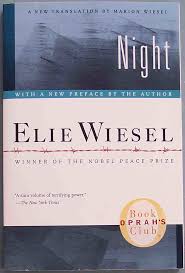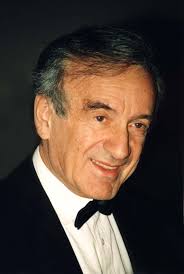Night Page #8
"Night" is a work by Elie Wiesel about his experience with his father in the Nazi German concentration camps at Auschwitz and Buchenwald in 1944–1945, at the height of the Holocaust toward the end of the Second World War. In just over 100 pages of sparse and fragmented narrative, Wiesel writes about the death of God and his own increasing disgust with humanity, reflected in the inversion of the parent–child relationship, as his father declines to a helpless state and Wiesel becomes his resentful teenage caregiver. "If only I could get rid of this dead weight ... Immediately I felt ashamed of myself, ashamed forever." In Night everything is inverted, every value destroyed. "Here there are no fathers, no brothers, no friends", a kapo tells him. "Everyone lives and dies for himself alone." Wiesel was 16 when Buchenwald was liberated by the United States Army in April 1945, too late for his father, who died after a beating while Wiesel lay silently
Dozens of inmates were there to receive us, sticks in hand, striking anywhere, anyone, without reason. The orders came: "Strip! Hurry up! Raus! Hold on only to your belt and your shoes..." Our clothes were to be thrown on the floor at the back of the barrack. There was a pile there already. New suits, old ones, torn overcoats, rags. For us it meant true equality: nakedness. We trembled in the cold. A few SS officers wandered through the room, looking for strong men. If vigor was that appreciated, perhaps one should try to appear sturdy? My father thought the opposite. Better not to draw attention. (We later found out that he had been right. Those who were selected that day were incorporated into the SonderKommando, the Kommando working in the crematoria. Béla Katz, the son of an important merchant of my town, had arrived in Birkenau with the first transport, one week ahead of us. When he found out that we were there, he succeeded in slipping us a note. He told us that having been chosen because of his strength, he had been forced to place his own father's body into the furnace.) The blows continued to rain on us: "To the barber!" Belt and shoes in hand, I let myself be dragged along to the barbers. Their clippers tore out our hair, shaved every hair on our bodies. My head was buzzing; the same thought surfacing over and over: not to be separated from my father. Freed from the barbers' clutches, we began to wander about the crowd, finding friends, acquaintances. Every encounter filled us with joy—yes, joy: Thank God! You are still alive! Some were crying. They used whatever strength they had left to cry. Why had they let themselves be brought here? Why didn't they die in their beds? Their words were interspersed with sobs. Suddenly someone threw his arms around me in a hug: Yehiel, the Sigheter rebbe's brother. He was weeping bitterly. I thought he was crying with joy at still being alive. "Don't cry, Yehiel," I said. "Don't waste your t e a r s ... " "Not cry? We're on the threshold of death. Soon, we shall be i n s i d e ... D o you understand? Inside. How could I not cry?" I watched darkness fade through the bluish skylights in the roof. I no longer was afraid. I was overcome by fatigue. The absent no longer entered our thoughts. One spoke of them—who knows what happened to them?—but their fate was not on our minds. We were incapable of thinking. Our senses were numbed, everything was fading into a fog. We no longer clung to anything. The instincts of self-preservation, of selfdefense, of pride, had all deserted us. In one terrifying moment of lucidity, I thought of us as damned souls wandering through the void, souls condemned to wander through space until the end of time, seeking redemption, seeking oblivion, without any hope of finding either. AROUND FIVE O'CLOCK in the morning, we were expelled from the barrack. The Kapos were beating us again, but I no longer felt the pain. A glacial wind was enveloping us. We were naked, holding our shoes and belts. An order: "Run!" And we ran. After a few minutes of running, a new barrack. A barrel of foul-smelling liquid stood by the door. Disinfection. Everybody soaked in it. Then came a hot shower. All very fast. As we left the showers, we were chased outside. And ordered to run some more. Another barrack: the storeroom. Very long tables. Mountains of prison garb. As we ran, they threw the clothes at us: pants, jackets, shirts... In a few seconds, we had ceased to be men. Had the situation not been so tragic, we might have laughed. We looked pretty strange! Meir Katz, a colossus, wore a child's pants, and Stern, a skinny little fellow, was floundering in a huge jacket. We immediately started to switch. I glanced over at my father. How changed he looked! His eyes were veiled. I wanted to tell him something, but I didn't know what.The night had passed completely. The morning star shone in the sky. I too had become a different person. The student of Talmud, the child I was, had been consumed by the flames. All that was left was a shape that resembled me. My soul had been invaded—and devoured—by a black flame. So many events had taken place in just a few hours that I had completely lost all notion of time. When had we left our homes? And the ghetto? And the train? Only a week ago? One night? One single night? How long had we been standing in the freezing wind? One hour? A single hour? Sixty minutes? Surely it was a dream. NOT FAR FROM US, prisoners were at work. Some were digging holes, others were carrying sand. None as much as glanced at us. We were withered trees in the heart of the desert. Behind me, people were talking. I had no desire to listen to what they were saying, or to know who was speaking and what about. Nobody dared raise his voice, even though there was no guard around. We whispered. Perhaps because of the thick smoke that poisoned the air and stung the throat. We were herded into yet another barrack, inside the Gypsy camp. We fell into ranks of five. "And now, stop moving!" There was no floor. A roof and four walls. Our feet sank into the mud. Again, the waiting. I fell asleep standing up. I dreamed of a bed, of my mother's hand on my face. I woke: I was standing, my feet in the mud. Some people collapsed, sliding into the mud. Others shouted: "Are you crazy? We were told to stand. Do you want to get us all in trouble?" As if all the troubles in the world were not already upon us. Little by little, we all sat down in the mud. But we had to get up whenever a Kapo came in to check if, by chance, somebody had a new pair of shoes. If so, we had to hand them over. No use protesting; the blows multiplied and, in the end, one still had to hand them over. I had new shoes myself. But as they were covered with a thick coat of mud, they had not been noticed. I thanked God, in an improvised prayer, for having created mud in His infinite and wondrous universe. Suddenly, the silence became more oppressive. An SS officer had come in and, with him, the smell of the Angel of Death. We stared at his fleshy lips. He harangued us from the center of the barrack: "You are in a concentration camp. In Auschwitz... A pause. He was observing the effect his words had produced. His face remains in my memory to this day. A tall man, in his thirties, crime written all over his forehead and his gaze. He looked at us as one would a pack of leprous dogs clinging to life. "Remember," he went on. "Remember it always, let it be graven in your memories. You are in Auschwitz. And Auschwitz is not a convalescent home. It is a concentration camp. Here, you must work. If you don't you will go straight to the chimney. To the crematorium. Work or crematorium—the choice is yours." We had already lived through a lot that night. We thought that nothing could frighten us anymore. But his harsh words sent shivers through us. The word "chimney" here was not an abstraction; it floated in the air, mingled with the smoke. It was, perhaps, the only word that had a real meaning in this place. He left the barrack. The Kapos arrived, shouting: "All specialists—locksmiths, carpenters, electricians, watchmakers—one step forward!" The rest of us were transferred to yet another barrack, this one of stone. We had permission to sit down. A Gypsy inmate was in charge. My father suddenly had a colic attack. He got up and asked politely, in German,"Excuse m e ... C o u l d you tell me where the toilets are located?" The Gypsy stared at him for a long time, from head to toe. As if he wished to ascertain that the person addressing him was actually a creature of flesh and bone, a human being with a body and a belly. Then, as if waking from a deep sleep, he slapped my father with such force that he fell down and then crawled back to his place on all fours. I stood petrified. What had happened to me? My father had just been struck, in front of me, and I had not even blinked. I had watched and kept silent. Only yesterday, I would have dug my nails into this criminal's flesh. Had I changed that much? So fast? Remorse began to gnaw at me. All I could think was: I shall never forgive them for this. My father must have guessed my thoughts, because he whispered in my ear: "It doesn't hurt." His cheek still bore the red mark of the hand.
Translation
Translate and read this book in other languages:
Select another language:
- - Select -
- 简体中文 (Chinese - Simplified)
- 繁體中文 (Chinese - Traditional)
- Español (Spanish)
- Esperanto (Esperanto)
- 日本語 (Japanese)
- Português (Portuguese)
- Deutsch (German)
- العربية (Arabic)
- Français (French)
- Русский (Russian)
- ಕನ್ನಡ (Kannada)
- 한국어 (Korean)
- עברית (Hebrew)
- Gaeilge (Irish)
- Українська (Ukrainian)
- اردو (Urdu)
- Magyar (Hungarian)
- मानक हिन्दी (Hindi)
- Indonesia (Indonesian)
- Italiano (Italian)
- தமிழ் (Tamil)
- Türkçe (Turkish)
- తెలుగు (Telugu)
- ภาษาไทย (Thai)
- Tiếng Việt (Vietnamese)
- Čeština (Czech)
- Polski (Polish)
- Bahasa Indonesia (Indonesian)
- Românește (Romanian)
- Nederlands (Dutch)
- Ελληνικά (Greek)
- Latinum (Latin)
- Svenska (Swedish)
- Dansk (Danish)
- Suomi (Finnish)
- فارسی (Persian)
- ייִדיש (Yiddish)
- հայերեն (Armenian)
- Norsk (Norwegian)
- English (English)
Citation
Use the citation below to add this book to your bibliography:
Style:MLAChicagoAPA
"Night Books." Literature.com. STANDS4 LLC, 2024. Web. 23 Dec. 2024. <https://www.literature.com/book/night_336>.




Discuss this Night book with the community:
Report Comment
We're doing our best to make sure our content is useful, accurate and safe.
If by any chance you spot an inappropriate comment while navigating through our website please use this form to let us know, and we'll take care of it shortly.
Attachment
You need to be logged in to favorite.
Log In